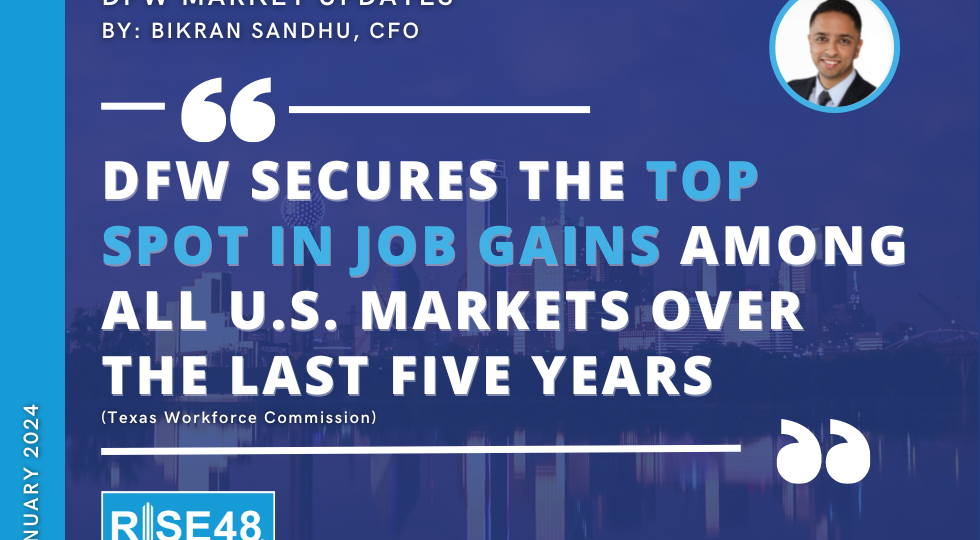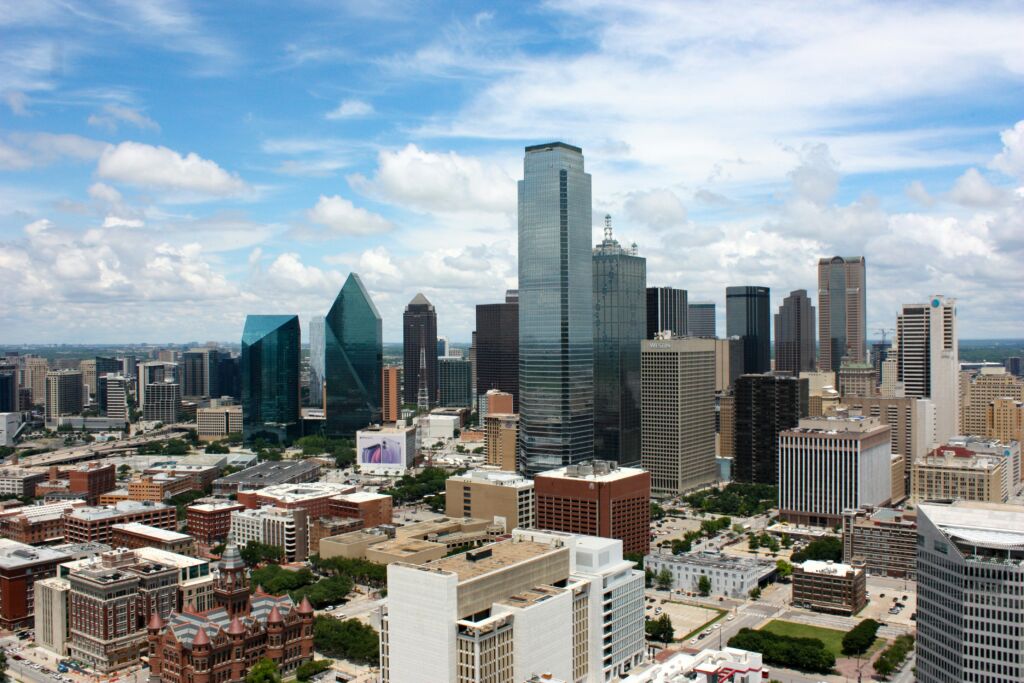
Thriving Opportunities and Soaring Job Growth in DFW
The Dallas-Fort Worth (DFW) region stands as a beacon of economic prosperity, exemplifying robust growth across various sectors. Recent developments underscore the positive attributes that have propelled the DFW economy, job market, and population growth.
H-E-B’s Expansion Signals Employment Surge
H-E-B, the San Antonio-based grocery chain, is set to expand its presence in North Texas with the opening of two new stores in Mansfield and Fort Worth, bringing a total of 1,000 jobs to the region. Both stores are expected to open in the spring, marking H-E-B’s continued expansion into North Texas after establishing a strong presence in Central Texas and the Houston area. The expansion not only contributes to job creation in the DFW metroplex, but also highlights the area’s desirability for significant business ventures and major corporations (Dallas Business Journal).

U-Haul Recognizes DFW as a Premier Moving Destination
Dallas has secured its position as one of the top destinations for individuals seeking a fresh start in 2023, according to U-Haul’s list of Top U.S. Growth Cities. Ranking at No. 9, Dallas is among three Texas cities in the Top 10, with Austin at No. 5 and College Station-Bryan at No. 6.
The growth index is determined by each city’s net gain or loss of one-way equipment from customer transactions throughout the year. The U-Haul Growth Index is derived from over 2.5 million one-way U-Haul truck, trailer, and U-Box moving container transactions annually in the U.S. and Canada (Dallas Innovates). Although U-Haul migration patterns may not directly align with population or economic expansion, the U-Haul Growth Index serves as a valuable indicator of states and cities’ success in both attracting and retaining residents.
This recognition of DFW as a premier moving location indicates a positive trend of people choosing DFW as their preferred place to relocate, thus attributing to sustained population growth and economic vitality.



Strong GDP Growth Showcases Economic Resilience
Dallas-Fort Worth (DFW) continues to demonstrate economic strength, as indicated by the U.S. Bureau of Economic Analysis’ data revealing a notable increase in the metro’s gross domestic product (GDP). In 2022, DFW’s GDP reached $688.9 billion, marking a nearly 13% surge from the previous year and outpacing major Texas cities. Houston recorded a GDP of $633.2 billion, Austin $222.1 billion, and San Antonio $163.1 billion. The real GDP, adjusted for inflation, showcases DFW’s robust performance at $592.5 billion. With a 5.7% growth rate, DFW ranks third among the nation’s major metros in 2022. The per capita real GDP in Dallas was $86,727, surpassing the national average.
Key contributors to DFW’s GDP growth include professional and business services, while construction and natural resources/mining sectors experienced slight declines. Noteworthy GDP growth was observed in counties like Wise and Rockwall. DFW’s economic vitality remains evident, with an unemployment rate of 3.7% in October and a positive job forecast for the end of 2023, outpacing national projections (Dallas Business Journal). Overall, the diverse economic landscape of the region has contributed to a robust GDP, solidifying its position as a key player in the national economic landscape.
Job Market Triumph: Dallas Leads in Job Gains
Dallas-Fort Worth (DFW) emerges as a job creation powerhouse, securing the top spot in job gains among all U.S. markets over the last five years, according to a RealPage analysis of Bureau of Labor Statistics data. The metro area has added nearly 600,000 jobs since November 2018, with substantial growth on the east side accounting for 456,000 positions. DFW’s job market expanded by over 17%, reaching 3.1 million workers in November 2023. Fort Worth-Arlington also demonstrated significant growth, ranking ninth on the list with the addition of 143,800 jobs, a growth rate exceeding 13%.



Texas has experienced record-setting job growth, adding 407,100 jobs since November 2022, according to Texas Workforce Commission data. The state’s economic resilience is underscored by its rapid recovery from pandemic-induced job losses, outpacing the national timeline. DFW, comprising 2% of the U.S. population, has contributed 10% of the net jobs created in the country since February 2020.
In a notable achievement, Dallas surpassed New York in annual job growth, a departure from the typical trend where New York City leads in yearly job additions. RealPage analysts attribute Dallas’ success to gains across all industry categories, while New York experienced losses in information, transportation, and professional services despite significant gains in education and health services.
Texas features prominently in the list of leading markets for job gains, with the greater Houston and Austin areas also making significant contributions. WalletHub ranks Austin among the top five cities for finding a new job, highlighting its robust job growth and favorable socioeconomic conditions. Plano and Irving also fare well, ranking ninth and 35th, respectively. The job growth in Austin and Dallas is noted as some of the strongest nationwide, with smaller markets showcasing notable growth in the job base with fewer employment additions (The Dallas Morning News).
Schneider Electric’s Job Creation Spree
Schneider Electric, a global leader in energy management and automation, is actively expanding its presence and workforce in Texas, showcasing its commitment to innovation, job creation, and sustainability. In Red Oak, near Dallas, the company is collaborating with Compass Datacenters to build a 110,000-square-foot integration facility for prefabricated modular data centers, supporting the growing demand in artificial intelligence. This $3 billion, multiyear project will create over 100 new jobs. Schneider Electric’s operations in Dallas, encompassing research, development, sales, training, and customer support, contribute to job creation and local business growth, solidifying Dallas as a hub for technological advancements (The Dallas Morning News).



Wall Street’s Embrace: New Investment and Jobs
Dallas is experiencing a surge in the financial sector, with three major Wall Street banks establishing new campuses this year, making it one of the fastest-growing metros in one of the fastest-growing states. Dallas now surpasses Chicago and Los Angeles, ranking as the No. 2 city for finance jobs in the U.S., trailing only New York. The influx of wealth and people moving from the coasts to Dallas has attracted asset managers, including Fisher Investments, Charles Schwab, and Canyon Partners. Despite lower average salaries compared to New York, Dallas benefits from being centrally located, offering direct flights and a strong quality of living.
The financial boom in Dallas has resulted in 28 million square feet of office space occupied by finance firms, second only to New York. The region has become a financial mecca in the South, outshining competitors like Atlanta and Miami. The expansion is driven by a virtuous cycle of job creation, catering to the influx of people and businesses moving to Texas.
Major banks like JPMorgan, Wells Fargo, and Bank of America, along with asset managers of all sizes, have contributed to the financial boom, leveraging Dallas’ central location and talent pool of engineering and technology workers. The region’s appeal extends beyond lower costs, emphasizing ease of access, quality of living, and a diffusion of talent in asset management and hedge funds. Executives from prominent financial institutions are relocating to North Texas, further solidifying Dallas’ position as a financial hub.
Job Growth Triumph: DFW Outpaces the Nation
The Dallas-Fort Worth-Arlington metro area led the nation in net job gains, adding 139,700 jobs from November 2022 to November 2023, according to a report from the U.S. Bureau of Labor Statistics. This makes it the top metro for net jobs added during this period, surpassing metros like New York-Newark-Jersey City and Los Angeles-Long Beach-Anaheim. In terms of percentage change in nonfarm employment, Dallas-Fort Worth-Arlington saw a 3.3% growth rate, ranking fourth after metros in Jacksonville, Las Vegas, and Raleigh, which all had 3.8% net job growth (Dallas Innovates).



Despite representing only 2% of the country’s population, DFW contributed to 4.5% of all new jobs in the U.S. between August 2022 and August 2023. SMU economics professor, Michael Davis, attributes DFW’s economic success to factors such as business-friendly regulations and ample land for development. In an interview with NBC 5 DFW Davis said, “What doesn’t surprise me is that our area and Texas has kept pace and in fact outperformed the rest of the U.S. economy” (Dallas Express). This exceptional job growth rate solidifies the region’s status as an economic powerhouse, outpacing national trends and setting a prime example for other states throughout the US.
In conclusion, the Dallas-Fort Worth region emerges as a standout in economic prosperity, showcasing robust growth across diverse sectors. Key indicators affirm DFW’s prominence in job creation, economic resilience, and population expansion. As the region continues to attract major players and foster innovation, the future looks promising for the Dallas-Fort Worth economy.
Since 2019, Rise48 Equity has completed over $2.09 Billion+ in total transactions, and currently has $1.65 Billion+ of Assets Under Management located in Phoenix and Dallas. All of the company’s assets under management are managed by Rise48 Equity’s vertically integrated property management company, Rise48 Communities.

